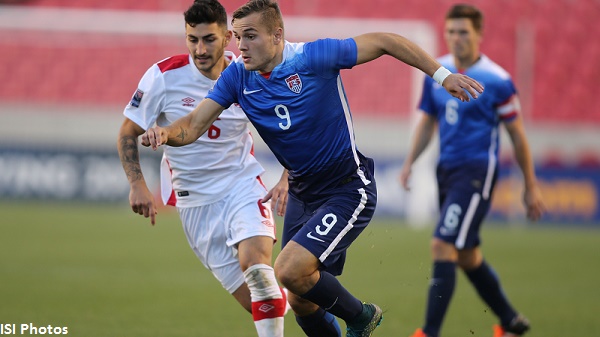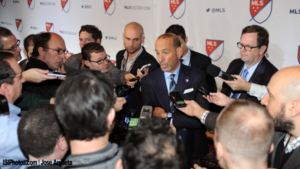Dure: No simple solution makes MLS perfect for Jordan Morris or fans

 Major League Soccer would be better if more players threw shoes at each other in the locker room.
Major League Soccer would be better if more players threw shoes at each other in the locker room.
That’s the rough conclusion we can take from Eric Wynalda’s annual shot across the bow of U.S. soccer at the NSCAA convention. He tells a story — and he tells it very well — of being a young player in Germany who had the temerity to make a joke about his socks after a loss. A veteran threw a shoe at him, and the trainer who stitched up his face urged him to apologize for the joke before they reached the team bus.
So the question facing MLS, in Wynalda’s mind, is not one of an adequate American talent pool or a lack of quality coaches. It’s whether the league can create that sort of pressure-cooker environment and provide an adequate challenge for its players — particularly young players like Jordan Morris, who is torn between two continents at the moment.
+READ: NSCAA Convention shows soccer still needs to work on sales pitch
Wynalda suggests promotion and relegation would help create that pressure cooker. But is that more of an issue for fans that it is for players?
I asked at the session: Is a bench player making $60,000 every two weeks at relegation-threatened Aston Villa really more motivated than a player making $60K a year at Columbus who’s trying to carve out a place for himself in the professional game? He thinks so, pointing out that the Villa player is likely to take a pay cut.
But soccer isn’t just about pay cuts for multimillionaires, is it? Your local beer league likely has occasional harsh words between teammates and fights between opponents. Wouldn’t the veteran of German football be inclined to throw a shoe at the impudent young American even without the financial concerns of promotion and relegation?
And who throws a shoe? Honestly?
And is Major League Soccer really so different? It’s easy for those of us in our mid-40s to pick on Millennials, just as Baby Boomers picked on us 25 years ago, but are today’s MLS youngsters really so inclined to shrug off a loss, especially in a league in which they could very easily find themselves knocking on the doors of NASL and USL teams to play for a substantial pay cut at a moment’s notice?
Those of us who have been in the dank tunnels of RFK Stadium can counter Wynalda’s shoe-throwing stories with a few of our own — getting a few grunt-filled postgame comments from players who just lost a game, or perhaps seeing a whiteboard with a fist-sized hole in it after the Houston Dynamo held a long postgame closed-door meeting (in violation of league rules on press access to locker rooms).
(Maybe that’s the argument for opening locker-room doors, common practice in the USA but not elsewhere in the world. We’re not going to see such property damage in the press conference room.)
+READ: Dure: 2015 was a great year for arguing about soccer
But for sake of argument, let’s accept Wynalda’s premise that MLS needs to be more challenging. What changes could we make that would make it so?
 We’ll start with promotion and relegation, though it’s an academic argument — the handful of lower-division clubs that have the capacity to play top-level soccer are trying to get into MLS already, and MLS owners who have spent hundreds of millions to build their league would surely be on the phone to the lawyers the minute those risky investments become even riskier. The NASL makes noise about promotion and relegation but is no closer to making it reality than anyone else.
We’ll start with promotion and relegation, though it’s an academic argument — the handful of lower-division clubs that have the capacity to play top-level soccer are trying to get into MLS already, and MLS owners who have spent hundreds of millions to build their league would surely be on the phone to the lawyers the minute those risky investments become even riskier. The NASL makes noise about promotion and relegation but is no closer to making it reality than anyone else.
Promotion and relegation is a wonderfully entertaining system around the world. Even my beer league has it, though we frankly try to avoid being promoted to the top division. There’s a wonderful romance to thinking your local club has a chance of moving up to face Barcelona or Bayern Munich — though, in the real 21st century, you need a megarich guy willing to spend hundreds of millions on a vanity project to climb the ranks.
We all love seeing a “little” club like Bournemouth in the Premier League, but the reality is that it has benefited from the large wallet of Russian owner Maxim Demin, who is now cashing in by selling part of his stake and looking for a stadium deal. (Sounds a lot like MLS expansion when you look at it that way, doesn’t it?)
From a player development standpoint, though, promotion and relegation has pros and cons. A relegation-threatened club in Europe will use every sort of negative tactic and every veteran player it has so it can stay up. In MLS, a club like D.C. United a couple of seasons ago can throw open the field to the youngsters and build for the future.
These are the risks Jordan Morris must be considering right now. By most accounts, he has a legitimate opportunity to go to a Bundesliga club, Werder Bremen, which just happens to be in a relegation fight this season. If he goes, will he make it onto the field? Will he be allowed to play through the likely mistakes new professionals make, or will he be yanked down to the reserves, which Landon Donovan couldn’t escape quickly enough, so the veterans can hack their way to Bundesliga safety?
So pro/rel isn’t a panacea. Can MLS do anything else to challenge its players?
+READ: MLS Homegrown system still murky as signings stymied by backroom battles
Having fewer teams in the playoffs and tweaking things so higher seeds have real home-field advantages might help with incentives. A Page playoff system, for example, would make the difference between second and third place matter. No more coasting into the postseason.
And perhaps the next round of collective bargaining could bump up the win bonuses that popped up in the most recent agreement.
But a change in culture ultimately doesn’t come from a league office. It comes from coaches and players. The tone of a locker room is set by the people in it.
That surely varies from club to club and maybe even game to game. Maybe a coach wants his players to forget a fluke loss — there’s no point in obsessing over a questionable call or ill-timed gust of wind — but throw shoes or smash a whiteboard when the loss is the result of a team breakdown.
Look around the world, and what do clubs do when they think a team is unmotivated? Someone gets fired, even if it’s Chelsea fan favorite Jose Mourinho.
 In MLS, the league office is already under pressure. Even with attendance booming and other numbers looking good (the touted financial losses reflect investment in facilities and players — we should worry if they were not spending more than they’re making right now), the league faces a competitive cauldron that most leagues could never imagine.
In MLS, the league office is already under pressure. Even with attendance booming and other numbers looking good (the touted financial losses reflect investment in facilities and players — we should worry if they were not spending more than they’re making right now), the league faces a competitive cauldron that most leagues could never imagine.
It’s the fourth- or fifth-biggest sports league within its own country, and its TV broadcasts compete with more Premier League coverage than most viewers can see in England. Then add Liga MX and every other league. Then add the noisy historical revisionists who think MLS somehow ruined U.S. soccer, as if things were just peachy in 1993.
The league office knows the game needs to be better. And the TV product needs to be better — NBC’s Premier League coverage blows away everything else on television right now. The league frankly has more control over the latter than the former.
Argue all you want with MLS, but if any of these simple solutions would take the league to the next level, they’d do them. There’s no MLS/U.S. Soccer/Illuminati conspiracy to keep the sport down.
+READ: Dure: Garber picks media battles wisely before 20th MLS Cup
It’s far more complicated than that. The solutions involve finding the right mix of marquee names and up-and-coming youth talent.
Then we have the age-old chicken-or-egg argument. Maybe everyone from Jurgen Klinsmann to the couch-bound Premier League fan will be more enthusiastic about MLS if the games are a little better. But that won’t happen if MLS gets pitiful TV ratings and can’t bring in more TV money, which will be more difficult in an era of cord-cutting that is threatening the business models of ESPN and other cable channels. Nor would something better than MLS rise immediately rise from the ashes if the league crashed tomorrow.
So it’s not just Jordan Morris who has a decision to make. Everyone does. We have to find the right balance between sending players overseas and having them stay here. We have to find the right balance between supporting MLS and urging it to get better. We have to find the right balance between youth and experience. We have to find the right balance between risk and practicality.
That’s not easy. We’ll have to keep arguing about everything from the big picture to the details, from locker rooms to the NSCAA convention. But it’s necessary.
And if a shoe comes flying your way, duck.
SOCCERWIRE MARKETPLACE
- visitRaleigh.com Showcase Series 2025, hosted by NCFC Youth
- OFFICIAL MANCHESTER CITY SOCCER CAMPS
- Wanted Licensed Youth Soccer Coach
- Join Official Elite Summer Soccer Camps with Europe’s Top Pro Clubs!
- The St. James FC Travel Staff Coach - North (Loudoun) & South (Fairfax)
- The St. James FC Girls Academy (GA) Head Coach - 2 teams
- The St James FC Boys Travel Tryouts
- OFFICIAL BAYERN MUNICH SUMMER CAMPS U.S.
- JOIN THE ALLIANCE!
- OFFICIAL FC BARCELONA CAMPS U.S.











